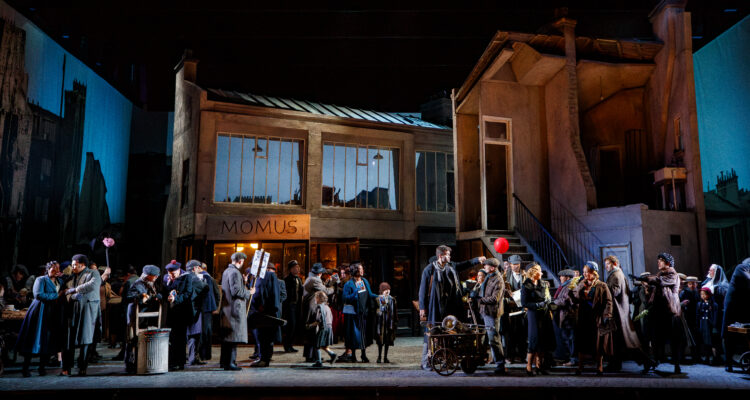La Bohème, is a classic opera by Puccini, and hopefully my first of many. This version, set in 1930s impoverished Paris, explores the infamous love story of Rodolfo and Mimi, a poet and seamstress. They live in the same building alongside other bohemians, and after meeting, fall instantly in love.
Isabella Bywater’s set is incredible: a beautiful and elaborate building, dynamic with multiple stories, brilliantly facilitating the four acts. The production value of this alone is astonishing and makes for the perfect background to the story.
The English National Opera (ENO) produces the opera in English rather than Italian. This, as well as the subtitles, allow for more accessibility to the plot, which is particularly comforting as a first timer. A surprise to me was that there were quite a few comedic elements, including playfulness amongst the characters – which wouldn’t have been as understood with the language barrier. Additionally, the singers do not have microphones, so having the subtitles is particularly useful at points when different conversations are being had simultaneously.
Rodolfo (Joshua Blue) sings with a grandeur that beautifully complements Mimi’s delicate, elusive voice. However, in such a large hall, his projection wasn’t as strong as I’d hoped, and at times, he sounded quieter than the other performers. Mimi (Nadine Benjamin) possesses a tender voice that pierces the heart, especially during her soaring high notes, singing with an effortless grace that marks her as an exceptional vocalist. Both characters share a charming playfulness and strong chemistry, which adds to the believability of their story.
Musetta (Vuvu Mpofu) brings a strong stage presence to the role, with excellent diction and delivery. Marcello (Charles Rice) stands out with a voice that left a lasting impression, surprising me with its power and richness. Overall, the cast of singers was exceptional, and their performance, paired with the live music, created a perfect harmony.
The orchestra, led flawlessly by Clelia Cafiero, was impeccable. The music not only conveyed the characters’ inner emotions and the essence of the lyrics but also shaped the overall atmosphere of the story. Far from being a mere background soundtrack, it became a character in its own right, subtly commenting on the unfolding drama. The violins, in particular, were mesmerizing, reaching heavenly climaxes that elevated the performance.
The story itself isn’t necessarily realistic – the characters fall in love within minutes. However, what I have found is that opera is unique because of the emotion that is felt, with each lyric and note there is depth and feeling. Not only is there more description, as you would have in a book rather than a film, but the mundane is poeticised. An example is the mention of Colline (Dingle Yandell) shaving his beard, where he refers to the “terrible aggression of a razor”. To me, this is the perfect example of the dramatization seen in opera, where feeling is felt to the fullest extent and its beauty embraced.
Cast includes: Charles Rice, Joshua Blue, Dingle Yandell, Patrick Alexander Keefe, Paul Sheehan, Nadine Benjamin, Vuvu Mpofu
Conductor: Clelia Cafiero
Director: Jonathan Miller
Revival Director: Crispin Lord
Designer: Isabella Bywater
Running Time: 2 hours 25 minutes (including 20 min interval)
Venue: London Coliseum
Review by Sofia Moran

